Best Landscape Photo Sizes for Web, Print, and Social Media
If you have many opportunities to take and edit landscape photos, you may have encountered the problem of choosing the right size. Specific image sizes are required to properly display photos on any platform or application, such as posting on a website, print or social media. If the size is incorrect, the trimming becomes uncomfortable, the finish becomes blurred, the visual is stretched and the original work is not reflected. By selecting the correct size, you can display the landscape photo size clearly, put it in the appropriate frame.
Part 1: What Is Landscape Photo Size?
The size of a photo landscape refers to an image that is wider than the height. This layout is often used for natural landscapes, group photographs, and wide scenery. It is suitable for scenes that require a wider field of view to provide more space from left to right. The size of a landscape photo can follow different aspect ratios, such as 3:2, 4:3, 16:,9 depending on the device or platform.
Web View
On websites and blogs, horizontal photos need to look fast and clear.
- 1200x800 pixels: Common landscape photo frame sizes available for most web pages.
- 1920x1080 pixels: Also known as Full HD, it is ideal for banners and large website headers.
Social Media
Depending on the platform, the size of the photo varies. By using the appropriate size, photos are displayed properly without being cut or stretched.
- Facebook cover: 820x312 pixels
- YouTube thumbnail: 1280x720 pixels
- Instagram landscape: 1080x566 pixels
Print Size
When printing, the size is usually measured in inches.
- 4x6 inch: Suitable for basic photo printing.
- 8x12 inches: Larger options while maintaining a ratio of 8x12 inches: 3:2.
- 18x24 ": Suitable for framing and wall hanging.
Part 2: 5 Best Tools to Resize or Enhance Landscape Photos
The resizing of a landscape photo can be suitable for posting on websites and social media, print, etc. However, using the wrong method or tool can affect the appearance of the image. So, it is the turn of the photo editing tool. With these tools, you can adjust the size while keeping the image as sharp and crisp as possible.
1. Adobe Photoshop
Adobe Photoshop is one of the most popular photo editing tools in the world. It has many functions that can change image size while controlling resolution, DPI, and image quality. It is not only resizing, but also becoming a powerful choice when you want to edit photos.
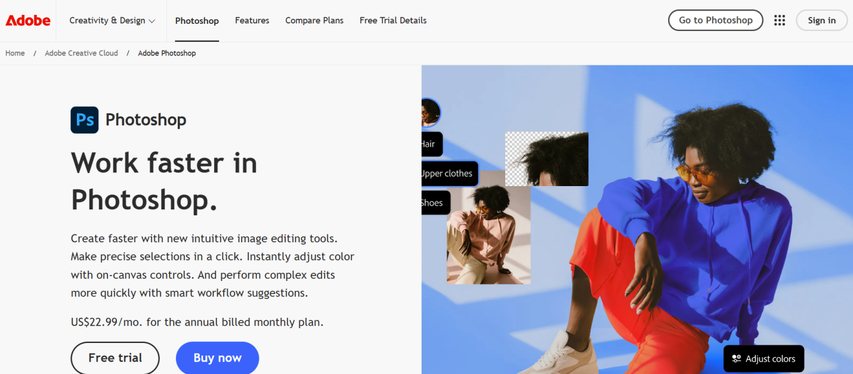
Pros:
- You can control image size and image quality in detail and get accurate results.
- Includes many additional tools to edit photos as well as resizing.
- Since batch processing is possible, many photos can be resized quickly at once.
Cons:
- This software requires a paid subscription and costs casual users.
- Because there are many functions, it takes time to learn.
- To run smoothly without losing speed, you need a powerful computer.
2. GIMP
GIMP is a free photo editing program that offers many features such as resizing, cropping, and DPI adjustment. It is a good option for those seeking an alternative to paid software. GIMP runs on various operating systems and supports various file formats.
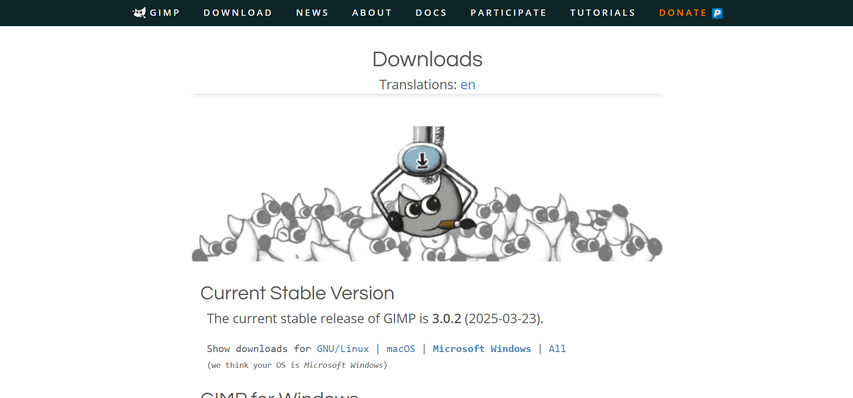
Pros:
- It is completely free and can be downloaded and used by anyone.
- Supports many image formats and editing tools such as cropping and color correction.
- Runs on Windows, Mac, and Linux operating systems.
Cons:
- The user interface is not smooth and may feel difficult to navigate.
- Some advanced features require additional plugins to work properly.
- For those who are not familiar with photo editing, it may be confusing at first.
3. Canva
Canva is an online tool designed to quickly resize simple graphic designs and images. Suitable for social media users who want to resize their photos to match their platform requirements. Canva offers preset sizes for many social networks, making it easy to fit images without guesswork.

Pros:
- The drag-and-drop interface allows anyone to use it quickly.
- Provide ready-made sizes for social media and correctly resize photos.
- The software does not need to be downloaded because it works online inthe browser.
Cons:
- Limited DPI and image quality control for printing.
- Some features and high-resolution export require a paid contract.
- It is not suitable for complex photo editing work,over resizing.
4. Pixlr
Pixlr is a web-based photo editor that allows you to quickly resize and edit images. It is convenient for simple tasks such as resizing and cropping photos without having to install anything. Pixlr works on the browser and supports common photo file formats.
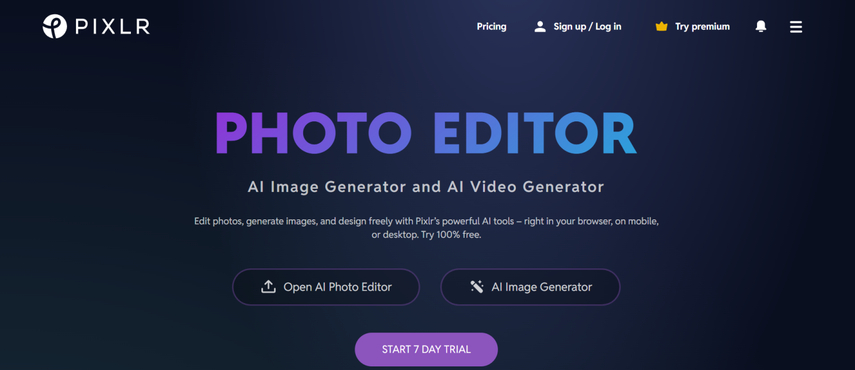
Pros:
- Quick and easy tool to resize photos without extra software.
- Internet access and browsers can be used on any device.
- Basic editing functions do not require an account.
Cons:
- Advanced editing functions are limited compared to desktop software.
- You need a reliable internet connection to work well.
- The free version displays ads and may interfere with workflow.
5. IrfanView
IrfanView is a lightweight image viewer that also provides basic resizing and batch processing tools. Designed for Windows users who want to quickly resize many photos without opening a heavy editor. IrfanView supports common image formats and provides simple editing tools such as cropping and changing DPIs.
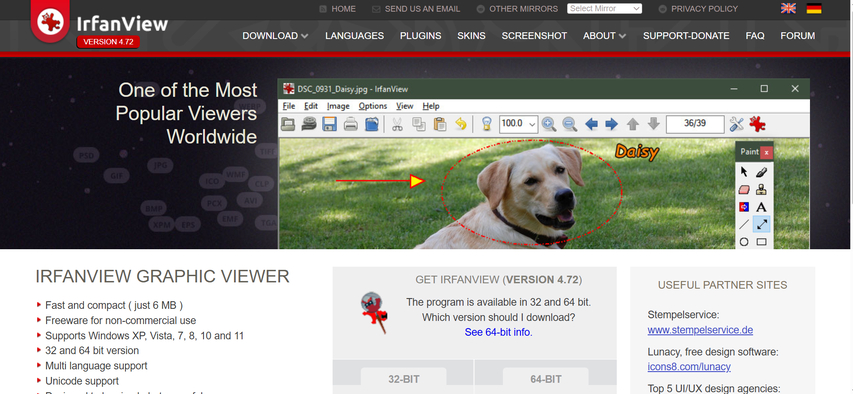
Pros:
- Easy to use very fast with simple interface.
- Supports batch resizing for editing many photos at once.
- Personal use is free without restrictions.
Cons:
- Since it is only for Windows, Mac and Linux users cannot use it.
- The basic editing function is not suitable for fine photo adjustment.
- The user interface is old and may feel inconvenient.
Part 3: Bonus Tip - Use HitPaw FotorPea to Improve Resized Image Quality
HitPaw FotorPea is a useful tool to sharpen and improve images after resizing. When you resize a photo, the crispness is often lost or blurred. This tool helps to restore lost details and make the image clear again. It is easy to use and effective in fixing the softness caused by changing the size of the photo. HitPaw FotorPea is recommended for those who want to show landscape photos sharp and clear, whether for printing or online sharing.
Key Features of HitPaw FotorPea
- Leading AI tools to enhance photos on Windows and Mac.
- Upgrade image clarity in one click with 16K resolution enhancement.
- Smoothly blur images and remove unwanted noise.
- Resize and sharpen pictures without losing detail.
- DeepSeek's AI image generator takes creativity to new heights.
How to Enhance Landscape Photos Using HitPaw FotorPea
Step 1: Start with HitPaw FotorPea Installation
Download HitPaw FotorPea from the official site. Follow instructions to install.
Step 2: Add a Photo to Enhance
Click on "Enhance Photos Now" and upload your file (supports PNG, JPEG, JPG, WEBP, TIFF).

Tip: Use sample files to explore AI power.
Step 3: Use an AI Enhancement Model
After uploading, click Preview. Choose from 9 AI models for specific photo improvements.
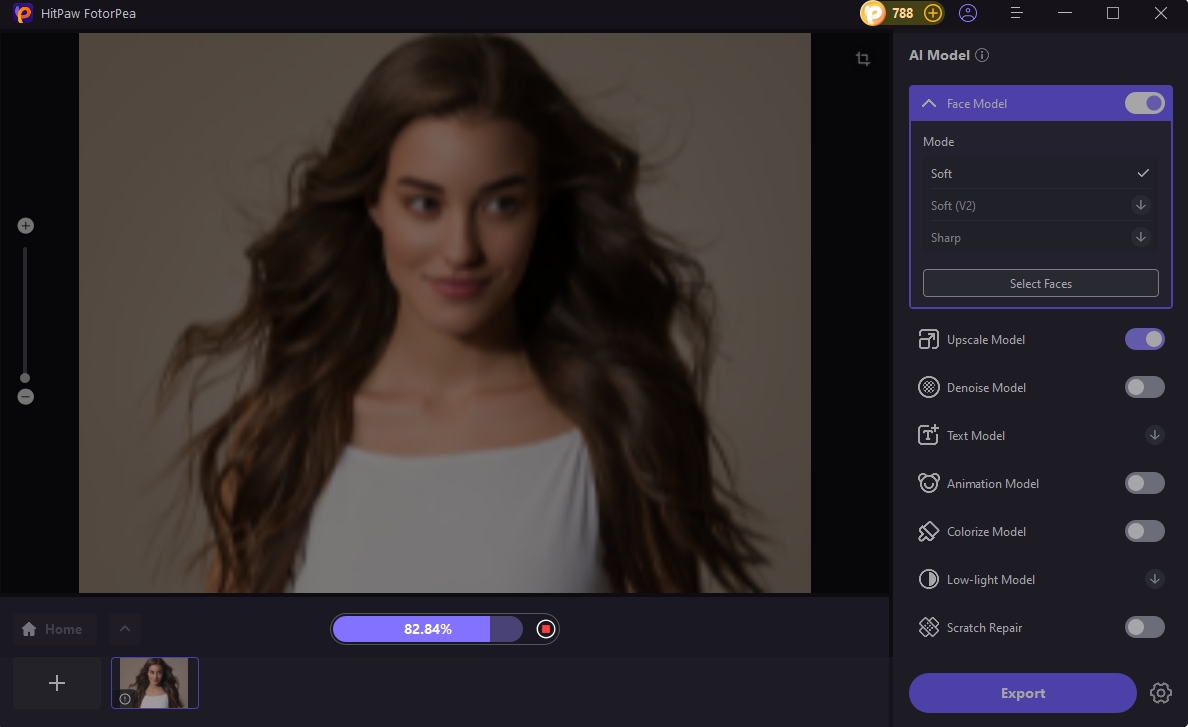
Step 4: Export the Final Image
Click Export when done to save your photo.
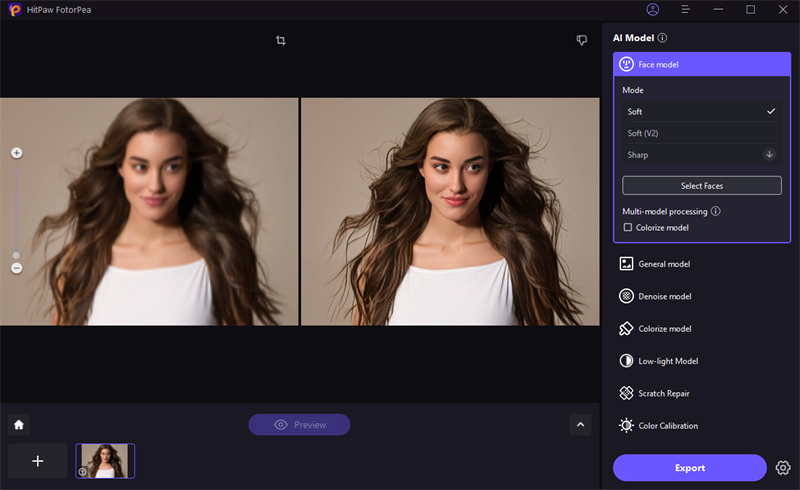
FAQs About Landscape Photo Size
Q1. Can resizing affect landscape photo sharpness?
A1. Yes. If you reduce or increase the size, the sharpness and detail of the photo may be lost. Therefore, it is important to use the appropriate tools and DPI settings.
Q2. What aspect ratio works best for large landscape wall prints?
A2. The 3:2 aspect ratio is common and is suitable for most prints like 8x12 and 18x24 inches. The width and height are well balanced and suitable for wide view.
Q3. How do I resize a landscape photo without losing resolution?
A3. Keep the original photo resolution high, resize with high quality software and use more than 300 DPI for printing. Improve your clarity with tools like FP Photo Enhancer after resizing.
Conclusion
Using the appropriate landscape photo size is important when sharing online, printing or adding to a project. The important thing is to choose the size that suits your platform and keep your photos crisp. When resizing, always check the DPI, use the correct aspect ratio. If the resized photo looks blurred, make it sharp and clean with HitPaw FotorPea Photo Enhancer. You can make your photos look better without complicated editing. If you choose the size wisely and are aware of the quality, no matter where you use it, your landscape photos will always look beautiful.


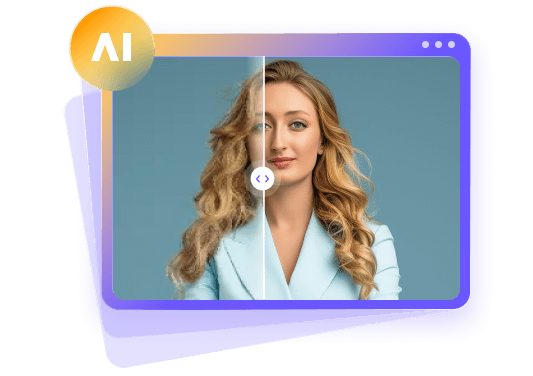




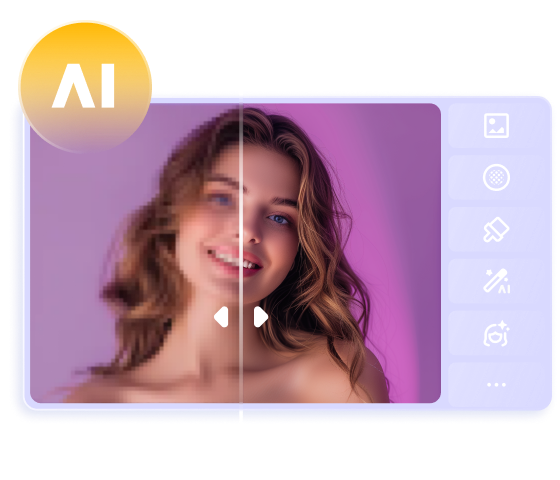
 HitPaw Univd (Video Converter)
HitPaw Univd (Video Converter)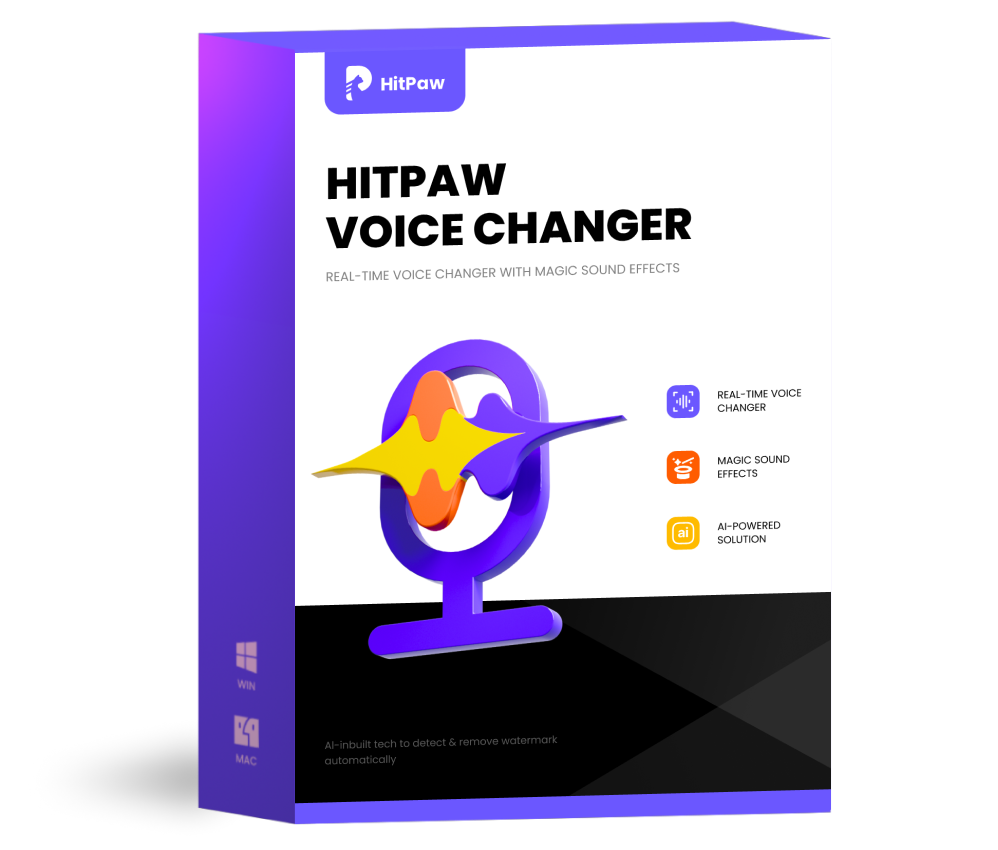 HitPaw VoicePea
HitPaw VoicePea  HitPaw VikPea (Video Enhancer)
HitPaw VikPea (Video Enhancer)
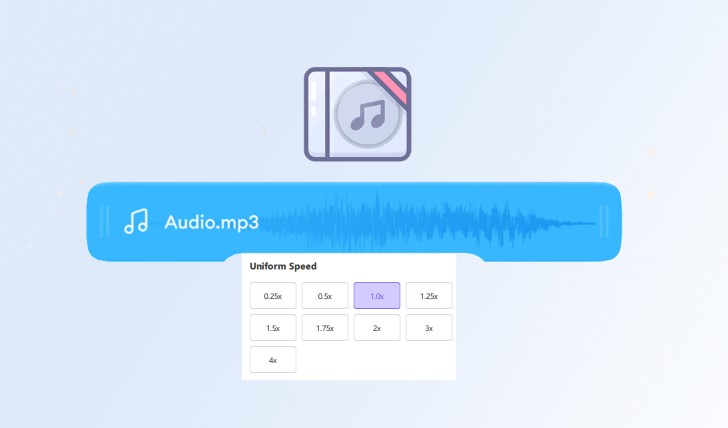


Share this article:
Select the product rating:
Daniel Walker
Editor-in-Chief
This post was written by Editor Daniel Walker whose passion lies in bridging the gap between cutting-edge technology and everyday creativity. The content he created inspires the audience to embrace digital tools confidently.
View all ArticlesLeave a Comment
Create your review for HitPaw articles